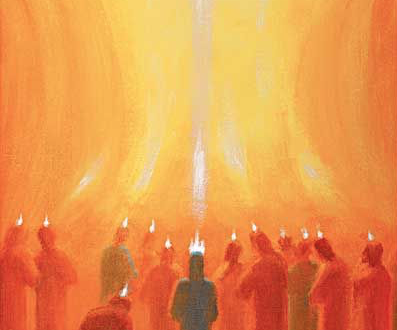The God of the Impossible!
Genesis 17:15-17; 18:9-15; 21:1-7
Time: 2067–2066 b.c.
Place: Canaan
Lesson Aim: To learn that God can do what we consider impossible.
Introduction
Promises have fallen on hard times. Once, a person’s word was as certain a guarantee as you could get. Then spoken words became suspect, and the written contract was born. Now we’ve spurned even that symbol of trust. Today it seems there is no contract that can’t be broken in the name of more money, better business, or newer priorities.
As it is commonly said, nothing’s ever an absolute guarantee—that is, except God’s Word. When the Lord made His promise to Abraham that Sarah would bear him a son, nothing in the universe would prevent it from happening. God was solemn in His pledge and He would not fail to bring it about. Even today, His children can count on the Father to do all that He has promised in His Son, the Lord Jesus.
I. The Divine Promise of a Child: Genesis 17:15-17
A. God’s Pledge Concerning Sarah: vss. 15-16
Genesis 16 describes how Abram and Sarai sought to produce an heir following a custom of their time. Sarai gave Hagar, her Egyptian maidservant, to Abram as a concubine. Consequently, Hagar became pregnant with Abram’s child.
Next, a dispute erupted between Sarai and Hagar. In fact, Sarai made life so difficult for Hagar that she run away. The angel of the Lord appeared to Hagar and directed her to return to Sarai. The emissary also told Hagar about her future son, Ishmael, promising that his descendants would be numerous.
Chapter 17 moves forward 13 years from the time when Ishmael was born (in 2080 B.C.). Abram was now 99 years old, and he still did not have the son whom the Lord had promised. By this time, the patriarch concluded that Ishmael would be his heir.
Now the Lord appeared again to Abram to reaffirm the covenant and the sign of circumcision. First, though, the Lord encouraged the patriarch to serve Him faithfully and be “blameless” (vs. 1). This suggests that apart from a context of wholehearted devotion to the Lord and obedience to His will, circumcision would be a meaningless rite.
As Abram lay in the facedown posture of humility (vs. 3), God changed the patriarch’s name. Previously, he was called “Abram” (vs. 5), which means “my father is exalted” and denoted his noble ancestry. From now on, he would be called, “Abraham,” which means “father of a multitude.” This change was appropriate, for the patriarch would become the ancestor of many through his yet-to-be-born son.
Next, God once more listed the provisions of the covenant. Abraham would have numerous offspring, who would one day possess the land of Canaan. The Lord wound up this recital with the pledge, “I will be their God” (vs. 8). The close relationship between the Lord and Abraham would be mirrored by the relationship between God and the patriarch’s descendants.
Previously, Abraham had requested a sign to confirm the covenant, and God responded by sending a firepot and a blazing torch through the pieces of animals (see chap. 15). This time, however, the Lord asked for a sign. Specifically, he told the patriarch to be “circumcised” (17:10) and to circumcise all the males in his household.
The above practice was to be repeated on all Abraham’s male descendants, along with others in the covenant community (vss. 11-14). The patriarch would have been familiar with circumcision, for as archaeologists tell us, tribes in America, Africa, and Australia practiced circumcision from earliest times.
In Abraham’s day, some Egyptians and perhaps others in the ancient Near East observed this custom. Yet, for the patriarch’s household, circumcision took on the distinction of representing the covenant.
Like the dead animal ceremony, circumcision represented an oath affirming the agreement between God and His people. In essence, circumcision meant, “If I remain untrue to the covenant, may I be cut off like my foreskin.” The cutting of circumcision and the splitting of animals both reflected the literal meaning of the Hebrew phrase rendered “to make a covenant,” which is “to cut a covenant.”
Much later, some religious leaders put too much emphasis on circumcision. Also, some early Jewish Christians disrupted the church because of their insistence on the practice. Yet, when properly understood and performed, circumcision was a meaningful sign of the covenant.
Verse 15 reveals that Abraham was not the only one to get a name change. The Lord also changed his wife’s name from “Sarai,” which means “my princess” or “my queen,” to “Sarah,” which means “a princess” or “a queen.” In the Hebrew language, the names seem to be linguistic variations of one another.
The birth name of “Sarai” looked to the past, especially the noble descent of Abraham’s wife. In contrast, the new name “Sarah” pointed to the future role God had planned for her as the ancestress of royal figures.
The Lord’s blessing on Sarah included enabling her once barren womb to bear a son for the patriarch. Indeed, through this child Sarah would become a “mother of nations” (vs. 16), and monarchs of countries would be among her descendants.
B. Abraham’s Skepticism: vs. 17
When Abraham heard God say that Sarah would bear a son, the patriarch bowed his face to the ground. Yet, then he began to consider his advanced age and wondered how a man who was nearly 100 could become a father. Also, with Sarah being 90 years old, it seemed impossible that she could have a child.
So, the patriarch laughed to himself in disbelief (Gen. 17:17). In light of the seemingly ridiculous promise, Abraham concluded that Ishmael would be his heir (vs. 18).
The patriarch’s statement reflects the customary practice in ancient times for a childless couple to adopt someone to carry on the family name and inherit the property. For instance, couples of that day might adopt a son born to one of the servants of the husband’s primary wife. Despite the novelty of the option, it was not God’s will for Abraham and Sarah.
The Lord countered patriarch’s statement by reiterating His original pledge, namely, that Sarah would become pregnant and give birth to a son. Verse 17 records the fact that the patriarch “laughed,” and this becomes the reason for giving his son the name of “Isaac” (vs. 19), which means “he laughs.” While the response of Isaac’s parents indicated disbelief (18:12), after the birth of the child, the laughter would point to joy (21:6).
The Lord declared that He would establish His covenant with Isaac and his descendants. Moreover, this covenant would be perpetual in nature (17:19). This did not mean that God had ignored Abraham’s previous statement concerning Ishmael. Like his father, Ishmael would become the head of a great nation. In addition, this nation would have 12 rulers (vs. 20; see 25:16).
Such statements notwithstanding, the Lord remained firm in His intent to make Isaac the recipient of the covenant promises. God revealed to Abraham that within a year Sarah would give birth to the child (17:21). The conversation then ended and the Lord left Abraham (vs. 22).
While the manner in which God had appeared to the patriarch is debated, the certainty of His promises is clear. Whereas earlier Abraham had been filled with doubt, this time he responded to the Lord’s speech by immediately obeying God in the matter of circumcision.
That same day Abraham, Ishmael, and all the other males in their household were circumcised (vss. 23-27). While the patriarch had some faults, the New Testament writers wisely regarded him as a model of genuine faith. In fact, Hebrews 11:11 emphasizes that Abraham believed in God despite the seeming impossibility of having an heir of his own.
II. The Divine Word of Assurance: Genesis 18:9-15
Not long after the episode recorded in Genesis 17, Abraham encountered three unexpected visitors (18:1). Though they looked like men, two of them were angels, while the third was called the “Lord” (vs. 13). This third figure may have been God in human form, or may have been an angel who in some special sense represented God.
At first, Abraham probably did not guess the heavenly nature of the three individuals who appeared at his tent (Heb. 13:2). The visitors arrived at midday, when people traditionally rested and waited for the sun to go down.
Perhaps the Lord chose this time for the arrival to test Abraham’s willingness to welcome guests, even though they had come at an inconvenient time. Hospitality was (and still is) a much-prized virtue throughout the Near East.
If the timing of the visit was a test, the patriarch acquitted himself admirably. Despite the heat, he hurried to meet his guests’ needs, and made sure his wife and servants hurried too.
Abraham showed respect and welcome by bowing low to the visitors (Gen. 18:2). He begged them to stay with him. The patriarch washed their feet and offered them a seat. He provided food in great variety, quality, and quantity. He declined to be seated until the visitors had finished their meal (vss. 3-7).
The meal prepared by Abraham’s household was served outside, beneath a tree (vs. 8). In keeping with the tradition at that time, the woman of the household, Sarah, kept out of sight. She stayed inside the tent, but was able to hear the conversation outside (vs. 9).
Sarah must have been surprised to hear herself mentioned in the exchange. While using her name, the visitors asked about her whereabouts (vs. 9). If (as it appears) Abraham had not yet mentioned his wife’s name before the visitors, this may have been the first clue that they were out of the ordinary. The next clue came when one of the visitors—the chief representative—stated that he would assuredly return about the same time the following year (possibly referring to springtime), and when he did, Sarah would already have a son (vs. 10).
B. Sarah’s Skepticism: vss. 11-12
Genesis 18:11 notes that Abraham and Sarah were old and advancing in years, and Sarah had long since passed menopause. So, when Sarah heard the divine prediction, she laughed to herself. She found it hard to believe that a worn-out woman such as herself would have the pleasure of becoming pregnant and bearing a son (vs. 12).
Either Abraham had not told Sarah yet about the birth God had promised, or else Sarah had not believed her husband. In any case, she was about 89 at this time and had never given birth, and her husband was a decade older than her. Not surprisingly, the idea of the two of them having a child at such advanced ages struck Sarah as being implausible.
C. God’s Unwavering Commitment: vss. 13-15
Apparently, Sarah kept her laughter and her thoughts to herself. Those outside the tent heard nothing from her. Yet, the Lord revealed that He knew what was going on in Sarah’s mind. So, He let out another clue to His divine nature (Gen. 18:13).
Sarah had long ago given up hope of having a child. The idea of it seemed impossible. Yet, with the Lord, all things are possible. He repeated His prediction that within a year Sarah would give birth (vs. 14).
For Sarah, there was no longer a point in hiding. The Lord knew she was there. Because Sarah was afraid of Him, she lied about laughing. Nonetheless, the Lord insisted on the truth, as He always does (vs. 15).
This was not the end of the visit the Lord and the two angels made to earth. They had accomplished one of the purposes of their visit: to renew God’s promise of a son to Abraham and Sarah. Yet, they had one other purpose, involving a judgment on some wicked cities.
In 18:16-33, God informed Abraham about the coming judgment on Sodom and Gomorrah. The angels’ visit to Lot (Abraham’s nephew) is recorded in 19:1-13, while verses 14-29 detail Lot and his family fleeing for their lives.
God destroyed the cities located in the plain of the Jordan (see 13:10), including both the people and the vegetation. In all, the cities of Sodom, Gomorrah, Admah, and Zeboiim were wiped out (see Deut. 29:23). Only Zoar, the fifth city of the plain, was spared.
III. The Divine Fulfillment: Genesis 21:1-7
A. The Birth of Isaac: vss. 1-2
Genesis 21:1 literally says that the “Lord visited Sarah.” Depending on the context, the Hebrew verb translated “visited” can be used for divine blessing or judgment. In the case of Sodom and Gomorrah, God destroyed those cities (Gen. 19). With respect to Sarah, the Lord manifested His grace on her by doing what He had promised (21:1).
Though Sarah was now 90 years old, this did not prevent God from enabling her to become pregnant and bear a son to Abraham in his old age (vs. 2). Indeed, she and her husband regarded the One who had given the promise of a child to be trustworthy (Heb. 11:11). The birth took place at the divinely appointed time in accordance with the word of the Lord (Gen. 21:2).
B. The Naming of Isaac: vs. 3
Genesis 21:3 says that Abraham named his newborn son “Isaac,” which (as noted earlier) means “he laughs.” Sarah wasn’t the only person who had laughed in disbelief upon initially hearing the divine promise (18:12). As we previously observed, according to 17:17, Abraham also laughed.
While the patriarch believed that God would give him offspring, Abraham did not think at the time the descendants would come through a son borne by Sarah. The name of Isaac would be a reminder of how the Lord had proved His faithfulness to the aged parents of their newborn.
C. The Circumcision of Isaac: vs. 4
We previously learned that both Abraham and all the males in his household were to be circumcised. This explains why the patriarch had his newborn son, Isaac, circumcised when he was eight days old. In short, Abraham was heeding God’s command (Gen. 21:4).
D. The Advanced Age of Isaac’s Parents: vss. 5-7
The Lord had been faithful to Abraham for many years. Now that the patriarch was a century old, he would remain unwavering in his trust in God (Gen. 21:5).
Sarah drew attention to the Lord’s faithfulness by noting that He, through the birth of Isaac, had brought her the joy of laughter. Moreover, all those who heard the good news of Isaac’s birth would signal their joy over the fulfillment of the divine promise (vs. 6).
Many years before, no one could have foretold that Sarah, a seemingly barren and aging woman, would ever be able to nurse children. Yet, against all humanly conceivable odds, she had given birth to a male infant, whom Sarah and her husband would enjoy in their old age (vs. 7).
This wasn’t a make-believe child. Isaac physically grew and eventually was weaned (vs. 8). In ancient times, infant mortality was high. By the time a child reached the age of two or three, there was a stronger likelihood he or she would survive. So, it was reasonable for children to be weaned at this time.
In the case of Isaac, such a milestone called for a great feast, which Abraham gladly held. It was the least he could do to celebrate the maturing of a child the patriarch and his wife had waited so long to have.
Key takeaways
We humans tend toward independence. It’s difficult for us to place our future, our money, and our careers in the hands of anyone else. Within our control, the outcome may not be an incredible success, but at least it will be predictable and safe. However, God desires that we step into a wonderful world of adventure with Him at the controls.
1. ABRAHAM’S JOURNEY OF FAITH. God stretched Abraham’s faith in many ways. The Lord told the patriarch that he would have a son through Sarah. Moving to an unknown country was a risk, but the promise of having children as an old, childless couple was physically impossible. Even Abraham thought God needed help here. Rather than resting in God’s promise, the patriarch began to create his own plan. Abraham heard and believed the Lord’s promises, but initially he seemed to have difficulty shifting his mind from the natural to the supernatural. It was hard for the patriarch to wait on the Lord and trust Him to accomplish His will in His way and in His time.
2. OUR JOURNEY OF FAITH. Are we any different than Abraham? God is stretching our faith, for example, when He asks us to watch our spouse suffer with cancer, or to forgive a drunken driver who killed our child or grandchild in a horrible accident. In the midst of such tragedies, the Lord wants us to trust His promise that He causes all things to work together for our eternal good (see Rom. 8:28). How can we do that? It seems impossible!
3. OUR DECISION TO TRUST GOD—NO MATTER WHAT. The record of Scripture and of our own experiences in following God, tell us that He seems to love the word “impossible.” He most often does not work through our agenda, and we don’t always see Him working in ways we understand. Yet, He asks us to learn to trust His heart.
4. HANDS OFF! It can be hard to believe that God can do all things and is working even when we cannot see Him at work. So, we “help” God work out His will. It’s like a three-year-old helping her parent paint the house. It may bring us satisfaction seeing our hand in the process. At best, however, it will be messy. At worst, it will have to be done all over again. Instead, we need to leave the painting to the Lord.



